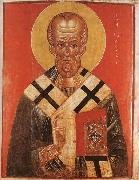Porslinet engros- Olja måleriet Engros- Måleriet Porslinet
|
|
|

|
|
|
|
|
|
|
|
|
|
|
|
|
|
|
Click to Enlarge
|
| Icon of St Nicholas
|
| 13th-14th century Egg tempera on panel, gesso ground, 107 x 82 cm The Hermitage, St. Petersburg Novgorod Veliky (Novgorod the Great) is one of the oldest Russian towns. In the 12th to 15th centuries it was the centre of a large republic, whose art was greatly influenced by popular ideas of beauty. This was especially striking in the art of painting of the 13th and early 14th centuries, the period to which the Hermitage icon of Saint Nicholas is dated. Its red background is usually noted, for the vivid red (cinnabar) background combined with the lemon-coloured halo and the bluishgreen vestment of the saint make a striking impression. The beauty of the icon is enhanced by the careful graphic treatment of the forms and by the ornamental design. The saint is represented as sublime and severe in accordance with the standard developed in the Christian art of Byzantium. But the vivid colours and embellishments adopted from folk art soften the hieratic posture and stern countenance, turning the austere Byzantine saint into the Russian Nik?la, who was believed to be involved in all of humans' daily doings and cares. Artist: UNKNOWN MASTER, Russian , Icon of St Nicholas , 1301-1350 , Russian , painting , religious
|
|
|
| Måleriet Identifieringen :: 65249
|
|
|
|
|
|
|
|
|
unknow artist
13th-14th century Egg tempera on panel, gesso ground, 107 x 82 cm The Hermitage, St. Petersburg Novgorod Veliky (Novgorod the Great) is one of the oldest Russian towns. In the 12th to 15th centuries it was the centre of a large republic, whose art was greatly influenced by popular ideas of beauty. This was especially striking in the art of painting of the 13th and early 14th centuries, the period to which the Hermitage icon of Saint Nicholas is dated. Its red background is usually noted, for the vivid red (cinnabar) background combined with the lemon-coloured halo and the bluishgreen vestment of the saint make a striking impression. The beauty of the icon is enhanced by the careful graphic treatment of the forms and by the ornamental design. The saint is represented as sublime and severe in accordance with the standard developed in the Christian art of Byzantium. But the vivid colours and embellishments adopted from folk art soften the hieratic posture and stern countenance, turning the austere Byzantine saint into the Russian Nik?la, who was believed to be involved in all of humans' daily doings and cares. Artist: UNKNOWN MASTER, Russian , Icon of St Nicholas , 1301-1350 , Russian , painting , religious
|
|
Related Paintings to unknow artist :.
| Bnder vender hjem fra marken med det sidste las korn | Lamentation | Interior of a Protestant Gothic Church with Architectural Elements of the Oude Kerk and Nieuwe Kerk in Amsterdam | Dark | Driving the Cattle to Pasture in the Morning | |
|
|
|
|
|
|
KOMMA I KONTAKT MED Oss
Xiamen Porslinet Engros- Olja Måleriet Sjukbåren Bomma till Engros- Stomme Mögel Spegel Stomme Spännet |
|








